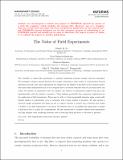| dc.contributor.author | Li, Jimmy Q. | |
| dc.contributor.author | Rusmevichientong, Paat | |
| dc.contributor.author | Simester, Duncan | |
| dc.contributor.author | Tsitsiklis, John N. | |
| dc.contributor.author | Zoumpoulis, Spyros I. | |
| dc.date.accessioned | 2015-10-05T15:53:39Z | |
| dc.date.available | 2015-10-05T15:53:39Z | |
| dc.date.issued | 2015-02 | |
| dc.date.submitted | 2012-05 | |
| dc.identifier.issn | 0025-1909 | |
| dc.identifier.issn | 1526-5501 | |
| dc.identifier.uri | http://hdl.handle.net/1721.1/99138 | |
| dc.description.abstract | The feasibility of using field experiments to optimize marketing decisions remains relatively unstudied. We investigate category pricing decisions that require estimating a large matrix of cross-product demand elasticities and ask the following question: How many experiments are required as the number of products in the category grows? Our main result demonstrates that if the categories have a favorable structure, we can learn faster and reduce the number of experiments that are required: the number of experiments required may grow just logarithmically with the number of products. These findings potentially have important implications for the application of field experiments. Firms may be able to obtain meaningful estimates using a practically feasible number of experiments, even in categories with a large number of products. We also provide a relatively simple mechanism that firms can use to evaluate whether a category has a structure that makes it feasible to use field experiments to set prices. We illustrate how to accomplish this using either a sample of historical data or a pilot set of experiments. We also discuss how to evaluate whether field experiments can help optimize other marketing decisions, such as selecting which products to advertise or promote. | en_US |
| dc.description.sponsorship | National Science Foundation (U.S.) (Grant CMMI-0856063) | en_US |
| dc.description.sponsorship | National Science Foundation (U.S.) (Grant CMMI-1158658) | en_US |
| dc.language.iso | en_US | |
| dc.publisher | Institute for Operations Research and the Management Sciences (INFORMS) | en_US |
| dc.relation.isversionof | http://dx.doi.org/10.1287/mnsc.2014.2066 | en_US |
| dc.rights | Creative Commons Attribution-Noncommercial-Share Alike | en_US |
| dc.rights.uri | http://creativecommons.org/licenses/by-nc-sa/4.0/ | en_US |
| dc.source | Other univ. web domain | en_US |
| dc.title | The Value of Field Experiments | en_US |
| dc.type | Article | en_US |
| dc.identifier.citation | Li, Jimmy Q., Paat Rusmevichientong, Duncan Simester, John N. Tsitsiklis, and Spyros I. Zoumpoulis. “The Value of Field Experiments.” Management Science 61, no. 7 (July 2015): 1722–1740. | en_US |
| dc.contributor.department | Massachusetts Institute of Technology. Department of Electrical Engineering and Computer Science | en_US |
| dc.contributor.department | Massachusetts Institute of Technology. Laboratory for Information and Decision Systems | en_US |
| dc.contributor.department | Sloan School of Management | en_US |
| dc.contributor.mitauthor | Li, Jimmy Q. | en_US |
| dc.contributor.mitauthor | Simester, Duncan | en_US |
| dc.contributor.mitauthor | Tsitsiklis, John N. | en_US |
| dc.relation.journal | Management Science | en_US |
| dc.eprint.version | Author's final manuscript | en_US |
| dc.type.uri | http://purl.org/eprint/type/JournalArticle | en_US |
| eprint.status | http://purl.org/eprint/status/PeerReviewed | en_US |
| dspace.orderedauthors | Li, Jimmy Q.; Rusmevichientong, Paat; Simester, Duncan; Tsitsiklis, John N.; Zoumpoulis, Spyros I. | en_US |
| dc.identifier.orcid | https://orcid.org/0000-0003-2758-0116 | |
| dc.identifier.orcid | https://orcid.org/0000-0003-2658-8239 | |
| mit.license | OPEN_ACCESS_POLICY | en_US |
| mit.metadata.status | Complete | |
